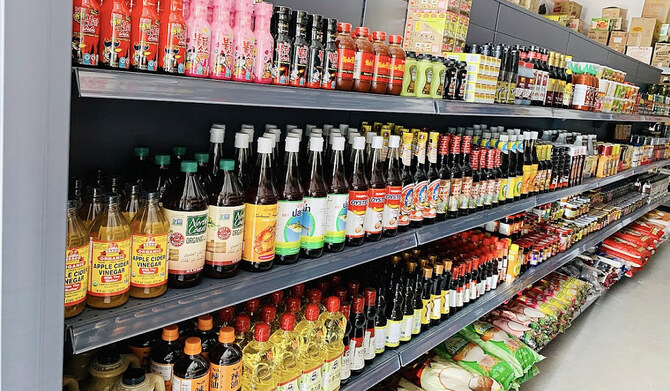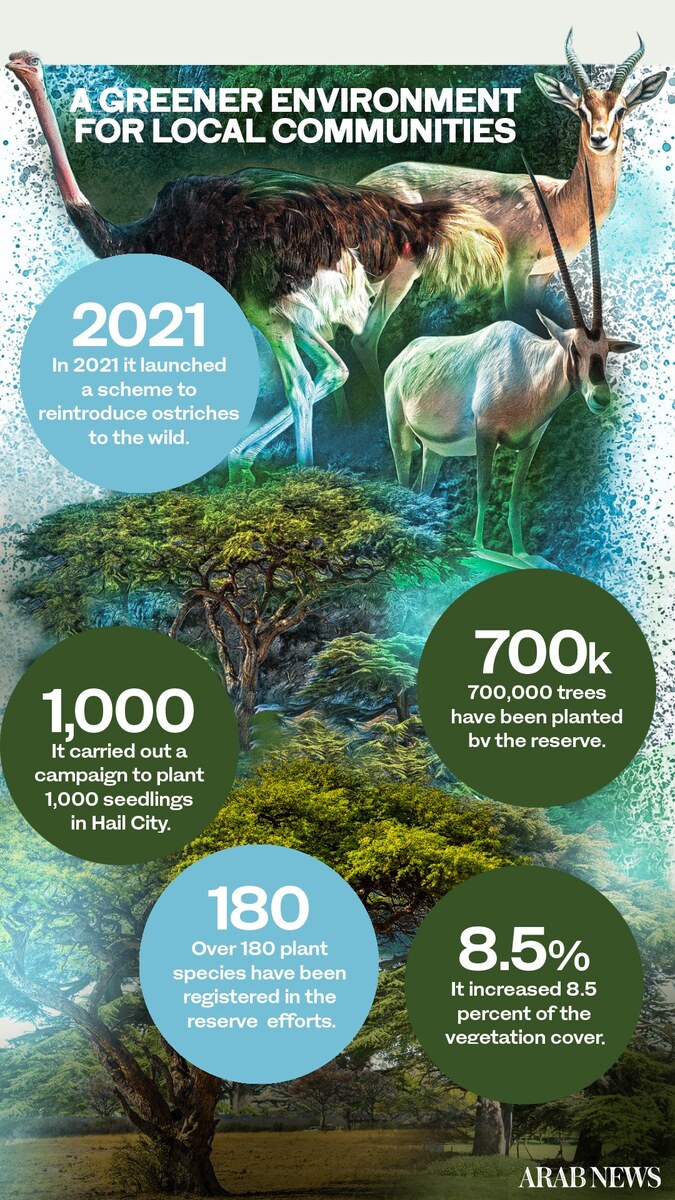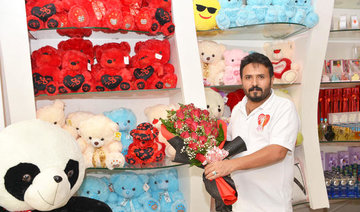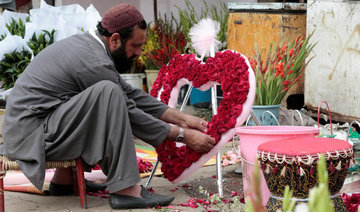DUBAI: Celebrating Valentine’s Day is no different from Mother’s Day and is therefore not un-Islamic, the former president for the Commission for the Promotion of Virtue and Prevention of Vice in Makkah, told Arab News.
Sheikh Ahmed Qasim Al-Ghamdi said Feb. 14 was enjoyed all around the world and was not exclusively for non-Muslims and was a social event that Muslims could also mark.
“Celebrating Valentine’s Day does not contradict Islamic teachings as it is a worldly, social matter just like celebrating the National Day and Mother’s Day,” he said.
“All these are common social matters shared by humanity and are not religious issues that require the existence of religious proof to permit it,” he said.
“There are many worldly things that we deal with morally that may be of interest to non-Muslim communities and became more common among Muslim communities because of their popularity,” he said, citing the Prophet as an example. “The Prophet dealt with many worldly things that came from non-Muslims.”
“Even greeting peaceful non-Muslims in their special religious holidays is permitted without participating in a forbidden act that contradicts Islam,” he said, downplaying perception that it was an imitation of non-Muslims when Muslims also celebrate the day of love.
The history of Valentine’s Day is shrouded in mystery like that of its patron saint, Saint Valentine.
One theory suggests Saint Valentine was a priest who served during the 3rd Century in Rome, who was executed for defying a decree from Emperor Claudius II that outlawed any remaining single men from marrying as they were better soldiers than those who had already wed.
According to the story, Valentine was sentenced to death after continued to he was found to be performing secret marriages for love-struck couples.
By the Middle Ages, Valentine would become one of the most popular saints in England and France, for his symbolism of love.
But the celebration of Valentine’s Day on Feb. 14 has many theories attached to it. Pope Gelasius declared the day as Valentine’s Day because it is claimed he wanted to ‘Christianize’ the Pagan fertility festival Lupercalia, which was commemorated the next day.
It was also in the Middle Ages, that people from France and England believed Feb. 14 was the beginning of birds’ mating season, which added to the idea that the middle of February should be a day for romance.
Aside from the usual exchange of chocolates, flowers and romantic gifts an estimated 1 billion Valentine’s Day cards are sent each year, making it the second largest card-sending holiday next to Christmas, where 2.6 billion cards are mailed.
To stress that Valentine’s Day was a universal celebration – and not anchored on a particular faith or religion – Al-Ghamdi spoke in support of fatwas that declared it permissible for Muslims to spend Feb. 14 with their loved ones.
Ahmed Mamdouh, the fatwa secretary of Dar Al-Ifta Al-Misriya (Egyptian Religious Edict House), on February issued a religious edict which stated: “There is no harm to allocate one day to show love to one another.”
Tunisian Grand Mufti Othman Battikh meanwhile rebuffed assertions that Valentine’s Day was a Christian tradition: “Anything that brings people closer together is good and desirable.”
Love is a natural human feeling, Al-Ghamdi said, and Valentine’s Day offered an opportunity to celebrate “a positive aspect of the human being.”
The Saudi cleric created uproar in 2014 when he said on a talk show hosted by renowned media personality Badria Al-Bishr that, contrary to what Muslims believed, women were not obliged to wear the niqab and were permitted use make-up and other beauty products.
The controversy was further fanned when Al-Ghamdi allowed his wife to be seen on national television without wearing the full-face veil, drawing reactions from religious conservatives.
Valentine is not ‘haram’, says ex-Saudi religious police boss
https://arab.news/5t39k
Valentine is not ‘haram’, says ex-Saudi religious police boss

Saudi king, crown prince offer condolences to US president for victims of New Orleans attack

- A pickup truck rampage in New Orleans on January 1 by US Army veteran Shamsud-Din Jabbar killed 14 people and injured dozens more
RIYADH: Saudi Arabia’s King Salman and Crown Prince Mohammed bin Salman offered their condolences to US President Joseph Biden on Friday for the victims of the terrorist attack that took place in New Orleans on New Year’s Day.
“As we condemn this shameful act, we express to Your Excellency, to the families of the deceased and to the friendly people of the United States of America our deepest condolences and sincere sympathy, wishing the injured a speedy recovery,” King Salman said in a cable, the Saudi Press Agency reported.
Crown Prince Mohammed, who is also the Kingdom’s prime minister, sent a similar cable to President Biden
Fourteen people were killed and dozens were injured in a pickup truck rampage by US Army veteran Shamsud-Din Jabbar in the southern city of New Orleans on January 1, in what the FBI said was an act of terrorism inspired by the Daesh group. He was later killed in a shootout with police.
FBI Deputy Assistant Director Christopher Raia said on Thursday that videos made by Jabbar just before the attack showed the 42-year-old Texas native supported Daesh, claimed to have joined the militant group before last summer and believed in a “war between the believers and nonbelievers.”
The FBI, however, clarified that Jabbar acted alone.
Jabbar’s rampage happened on the same day Matthew Livelsberger, an active duty member of the US Army Special Forces, drove a Tesla Cybertruck packed with firework mortars and camp fuel canisters and exploded it outside the entrance of the Trump International Hotel in Las Vegas, injuring seven people.
Investigators on Friday said Livelsberger wrote that the explosion was meant to serve as a “wake up call” and that the country was “terminally ill and headed toward collapse.”
(With AP)
From Seoul to Saudi: How Korean and Japanese stores are influencing Saudi tastes

- Exotic flavors find favor in Saudi cities
- Food trend spurred by pop stars and TV dramas
RIYADH: Saudi Arabia’s streets are no stranger to international flavors, but in recent years, Korean and Japanese specialty supermarkets have found new popularity. From rows of instant noodles and savory sauces to unique skincare products, these stores offer a slice of East Asia in the heart of Saudi Arabia. Cities like Riyadh and Alkhobar are embracing this cultural and culinary fusion, highlighting the growing appetite for global experiences among Saudis, driven by the influence of entertainment and a desire for novelty.
Korean culture, spearheaded by the global phenomenon of K-pop and K-dramas, has taken the world by storm, and Saudi Arabia is no exception. For Fahad Al-Salmi, the owner of the Japanese and Korean Mart in Riyadh, this cultural wave was a business opportunity waiting to happen. “Our decision to open a Korean supermarket in Saudi Arabia was driven by a growing interest in Korean culture, particularly through K-pop, K-dramas, and Korean cuisine,” Al-Salmi told Arab News.

“Many Saudis are curious about trying new flavors and exploring international cultures, and Korea has become a popular trend. We saw an opportunity to introduce authentic Korean products to satisfy that demand and to offer a unique experience for local customers,” he added.
This curiosity is translating into tangible lifestyle changes. Korean snacks, instant noodles, and condiments like gochujang (Korean chili paste) and soy sauce have become staples for many families. Al-Salmi observes that these products are now becoming integrated into everyday meals for many Saudi households. “With the influence of Korean entertainment, many Saudis are more open to trying international foods and incorporating them into their diets,” he noted.
HIGHLIGHTS
• While Riyadh has witnessed a growing number of specialty stores, cities like Alkhobar and Al-Shamalia are also joining the movement.
• By offering authentic and unique products, Korean and Japanese supermarkets are creating connections between cultures.
For Abdusalam Thodi, the owner of Kimchi Supermarket in Riyadh, the inspiration was personal. “I was inspired by Korea to open a Korean supermarket because I studied there,” shared Thodi. “Our bestsellers are Korean noodles and sauces, but we also offer a wide range of cultural products and specialty foods. Korean cuisine and culture are rapidly growing in popularity here in Saudi Arabia, and we’re proud to be part of this exciting trend.”

While Riyadh has witnessed a growing number of these specialty stores, cities like Alkhobar and Al-Shamalia are also joining the movement. The expansion into these regions highlights the nationwide appeal of Korean and Japanese supermarkets, catering to the tastes and preferences of Saudis across the Kingdom.
The allure of these supermarkets extends far beyond their aisles. They offer customers the chance to engage with a lifestyle that, until recently, was only accessible through screens. For long-time K-drama fan Fatimah Al-Dossari, the emergence of Korean supermarkets has been a dream come true.
With the influence of Korean entertainment, many Saudis are more open to trying international foods and incorporating them into their diets.
Fahad Al-Salmi, Japanese and Korean Mart owner
“I’ve been watching Korean dramas for 20 years, and I never imagined I’d get to try the food they enjoy on screen!” said Al-Dossari. “It’s amazing to see so many supermarkets now offering popular Korean snacks, noodles, cooking sauces, and seasonings. I couldn’t be happier — shopping for these items has become a regular treat for me every three weeks!"

Zainab Al-Salman, a frequent customer, describes the experience of shopping at these stores as a unique cultural adventure. “Trying new things that represent a different culture is always a great way to get to know this culture in your home and have a fun time exploring it,” she said. “Every time I go, it’s like visiting a museum. I tend to feel happy and joyful trying to pick what I will try next that I haven’t tried before.”
Al-Salman also appreciates the practical advantages of these markets. “Specialty markets often offer more options than just one section in other regular markets, and sometimes they are even cheaper,” she added.
The availability of Korean and Japanese products is fostering new habits in families. Al-Salman shared how her family’s shopping behavior has evolved thanks to these specialty supermarkets.
“Yes, it did help me build some habits like buying a kimchi bowl every few months for the family,” she explained. “That opened their eyes to other different things.”
Korean and Japanese supermarkets offer products and experiences that traditional supermarkets cannot replicate.
“Some of these products are not popular (enough) to be produced and sold in our markets, like different types of skincare products that are more effective than others,” noted Al-Salman. “This makes the supermarkets more attractive due to having more options to choose between.”
Al-Salman described how specialty markets provide a sense of wonder for shoppers. “For people who’ve never visited, their first visit is always like a good experience for them to see different things than a regular market,” she said.
For business owners like Al-Salmi and Thodi, the journey is as rewarding as it is exciting. By offering authentic and unique products, they are creating connections between cultures.
As Al-Dossari summed it up: “It’s amazing to see how food can bring people closer to a culture.”
With the growing influence of global cultures, Saudi Arabia’s retail sector is transforming, one supermarket aisle at a time. Cities like Alkhobar and Al-Shamalia are now key players in this transformation, ensuring that the bond between cultures continues to grow stronger with each passing year.
Qassim’s berry farms revolutionizing Saudi agriculture

- Local produce matching global quality standards
- Advanced hydroponics vital to success, says expert
QASSIM: The Qassim region has become the leading producer of strawberries and blueberries in Saudi Arabia, challenging international imports with produce that matches global quality standards, the Saudi Press Agency reported recently.
This success has been driven by many farmers’ ambition to innovate, modernize, and create quality alternatives to imported varieties.
The path to premium berry production in Qassim required multiple developments, agricultural engineer Saleh Ibrahim Al-Keaid told the SPA.

Al-Keaid said that the journey to excellence involved extensive research and collaboration with international experts.
“We spent a full year experimenting with different varieties and agricultural elements to achieve our current success,” he said.
The result is a premium product that rivals American and European berries in quality, size and yield.
FASTFACTS
• Modern approach to farming prioritizes organic farming methods, ensuring all fertilizers and pesticides meet strict safety standards.
• Advanced hydropnic systems utilize vertical farming towers — up to seven levels high —equipped with volcanic rock substrates and top-down irrigation.
These types of fruits are sensitive, requiring special soil, complementary elements, and suitable conditions through protected greenhouses.
The success hinges on innovative farming techniques, particularly the adoption of advanced hydroponic systems.

These systems utilize vertical farming towers — up to seven levels high —equipped with volcanic rock substrates and top-down irrigation.
This modern approach prioritizes organic farming methods, ensuring all fertilizers and pesticides meet strict safety standards.
Perhaps most impressive are the efficiency gains. According to Al-Keaid, the hydroponic system achieves remarkable water conservation, reducing consumption by 80 percent compared to traditional methods.
Additionally, the production capacity in hydroponic farming is multiple times that of soil-based farming.
The space efficiency is equally striking: a single greenhouse of 360 sq. meters can accommodate 9,000 seedlings — approximately triple the capacity of conventional soil-based farming.
Furthermore, caring for the seedlings is easier, requires less effort, and uses fewer fertilizers compared to soil-based farming.
How a Saudi royal reserve combines sustainability with support for the local community

- Imam Turki bin Abdullah Royal Reserve promotes educational partnerships, controlled grazing, and sustainable hunting
- Authority CEO Mohammed Al-Shaalan says community engagement links environmental protection with economic development
RIYADH: The Imam Turki bin Abdullah Royal Reserve in northern Saudi Arabia was established in 2018 to help preserve a thriving natural environment and to promote a sustainable local economy, free from overgrazing and unregulated hunting.
Committed to enhancing the quality of life for the local community, the Imam Turki bin Abdullah Royal Reserve Development Authority works to protect biodiversity while engaging residents as stakeholders in advancing its environmental and development goals.
Headquartered in the Saudi capital, Riyadh, the authority invites residents to take part in educational programs, workshops, and collaborations to actively protect the environment and promote sustainable livelihoods.

This collaboration includes specialized training courses held in partnership with educational and development institutions, including the University of Hail, Northern Border University, and the Human Resources Development Fund.
These courses are designed to equip the community with the skills needed to support the reserve’s environmental and development goals, including the effort to increase vegetation through tree planting and the prevention of logging.
“Seven hundred thousand trees have been planted” since the reserve was established, Mohammed Al-Shaalan, the authority’s CEO, told Arab News on the sidelines of the UN conference on biodiversity, COP16, in Riyadh last month.
“Because of the plantation and the protection, the normalized difference vegetation index has increased from 2 percent to 8 percent over the past four years, which tells us that if we give a little bit of breath for the environment, it could restore itself very fast.”
Opinion
This section contains relevant reference points, placed in (Opinion field)
The index is a measure for assessing vegetation health and density using sensor data, helping track changes in plant health.
The reserve’s efforts align with the Kingdom’s goal of planting 10 billion trees by 2100 as part of the Saudi Green Initiative, which aims to rehabilitate more than 74 million hectares of land.
To date, more than 70 million trees have been planted nationwide.

In addition to its commitment to enhancing biodiversity, the reserve provides valuable resources for the local community. It grants controlled access to local herders, allowing their animals to graze and maintain a healthy biocycle for plants.
The reserve issues special permits for grazing in designated areas, allowing livestock owners to sustainably utilize the vegetation. This organized grazing process helps mitigate risks associated with excessive growth, including the potential for wildfires.
Among the local herders who frequently visits the reserve to graze his cattle is Farhan Al-Rughailan. He believes allowing livestock to graze helps maintain plant health, prevents diseases, and ensures sustainable use of the reserve’s resources.

hen plants are growing, they must be cut regularly, otherwise they become poisonous if they stay for too long without animals grazing on them,” he told Arab News.
Like other herders, Al-Rughailan is only permitted to visit the reserve during specific times specified on his permit. The policy has helped reduce the economic cost of feeding livestock.
“As a royal reserve, one of our mandates is the local community, and we have to take care of it,” said authority CEO Al-Shaalan.
“Today, we have more than 150 livestock, between camels and sheep, and livestock breeders in the local community are used to paying SAR 100 million ($26.6 million) to SAR 120 million to buy food for livestock. So, instead of buying hay and livestock feed, we allow them to graze.”

In addition to sustainable grazing, the authority has introduced sustainable hunting in a designated area located in the northern part of the reserve, which is also intended to support the local community without harming the ecosystem.
Although the sustainable hunting area makes up just 2.18 percent of the reserve’s total area, it provides a valuable boost to the local economy. Prey is raised in a controlled environment to ensure the sustainability of targeted species while preserving the reserve’s ecosystem.
DID YOUKNOW?
• The Imam Turki Royal Reserve employs 180 rangers to monitor and address issues related to wildlife and plants.
• According to its CEO, nearly 90 percent of the reserve is now protected.
• The Royal Reserve’s Development Authority uses drone technology to monitor and protect the environment.
• The reserve offers volunteer opportunities, fostering cooperation and environmental responsibility within the community.
Hunting is a popular activity for both locals and tourists in Saudi Arabia, but it has historically had a negative impact on native wildlife. Overhunting in the past has led to the decline of species such as the Arabian leopard, ibex, and oryx.
Today, the Kingdom’s Environmental Law and executive regulations prohibit the trade, killing, or hunting of endangered wildlife species, along with their derivatives and products. Violators can face fines of up to SAR 30 million, 10 years in prison, or both.

“Instead of people going and hunting in the wilderness, we provide a sustainable production of wildlife that we can release for hunting,” said Al-Shaalan.
This model was adopted by the UN in 1992, with the biodiversity agreement recognizing sustainable hunting as a conservation tool, affirming that wildlife can be preserved by allowing controlled hunting.
“There are always people who want to hunt,” he said. “But if you give them a legitimate way to hunt, it will reduce the pressure on wildlife.”

MWL sends condolences to Montenegro shooting victims

- The organization affirmed its full solidarity with Montenegro in this difficult period
MAKKAH: The Muslim World League has extended its condolences and sympathies to the government and people of Montenegro, as well as to the families of the victims, following the shooting incident in Cetinje, resulting in deaths and injuries to several people.
The organization affirmed its full solidarity with Montenegro in this difficult period.






















